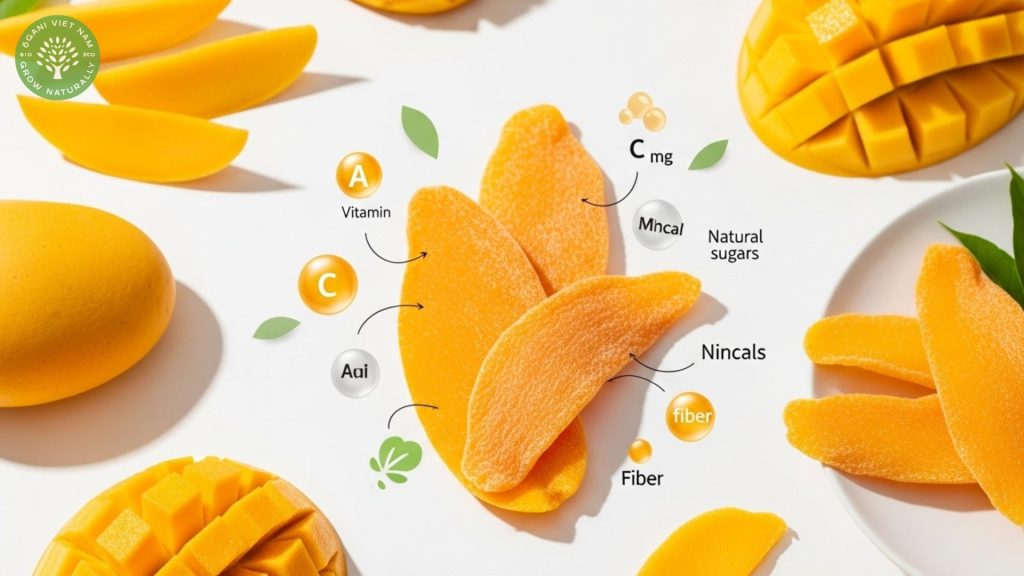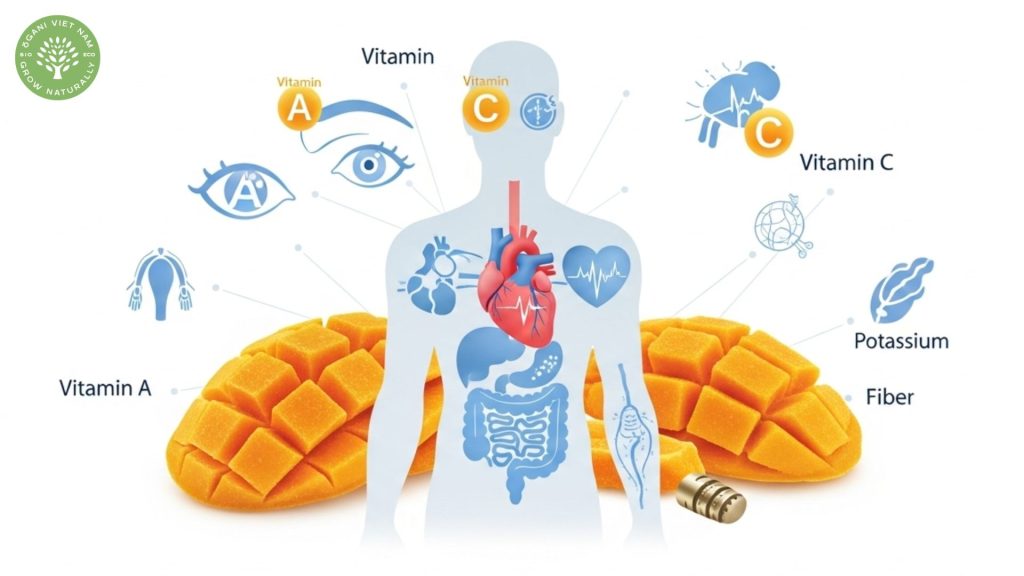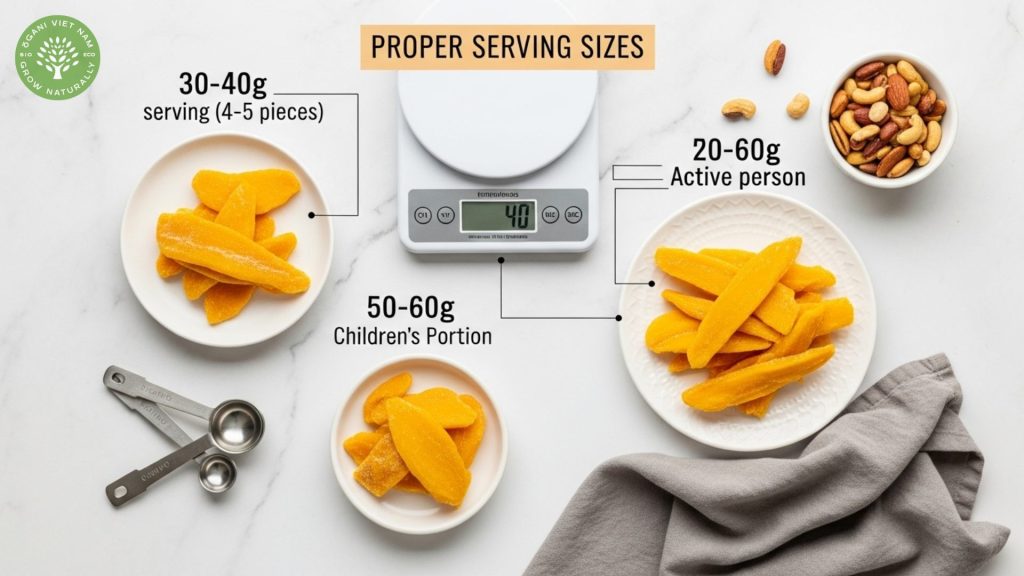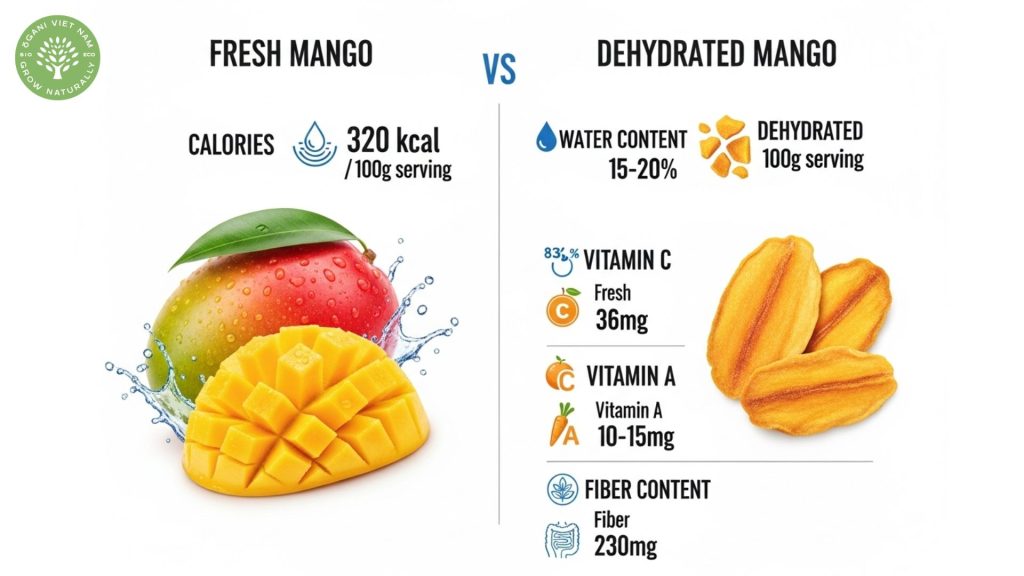
When exploring dehydrated mango nutrition, you’ll discover it’s more than just a sweet snack — it’s a natural source of energy, packed with vitamins and minerals that your body can truly benefit from. With each bite, you’re getting concentrated goodness from real mangoes, gently dried to keep their flavor and nutrients intact.
At Ogani VN, we know that simple, honest food matters. That’s why we choose quality mangoes and keep things clean — no added sugar, no preservatives, just real fruit, the way it should be. For busy mornings, mid-day cravings, or something to pack for your kids, dehydrated mango is a tasty and wholesome choice you can feel good about.
Essential nutritional profile of dehydrated mango
Dehydrated mango is a naturally sweet and energizing snack that delivers a surprising amount of nutrition in each bite. A typical 40-gram serving (about 5–6 pieces) provides around 140 calories, mostly from natural fruit sugars and complex carbs.
Because the water is removed during drying, the nutrients become more concentrated. That’s why dried mango is high in carbohydrates (about 85%), low in fat (less than 1 gram), and contains a small amount of protein (1–2 grams per serving).
One of its key benefits is the fiber. Each serving gives you 2–3 grams of dietary fiber, which supports digestion and helps keep blood sugar levels steady. The natural sugars — mainly fructose, glucose, and sucrose — provide quick energy, while the fiber helps slow down absorption for more lasting fuel.
Vitamin and mineral powerhouse benefits
Dehydrated mangoes are packed with both fat-soluble and water-soluble vitamins, making them a surprisingly nutrient-rich snack. One of the standout nutrients is vitamin A—just one serving can provide about 25–30% of your daily recommended intake. This comes mainly from beta-carotene and other carotenoids, which also give mangoes their beautiful orange color.
While the vitamin C content does decrease during drying, a meaningful amount still remains. Fresh mangoes offer around 60mg of vitamin C per 100g, and dried mango retains roughly 30–40% of that—enough to still support your immune system and collagen production.
In terms of minerals, potassium takes the lead, helping with heart health and muscle function. You’ll also find magnesium (important for bone health and energy production), plus small amounts of iron, calcium, and phosphorus. Together, these minerals play key roles in maintaining fluid balance, supporting strong bones, and fueling essential enzyme activity throughout your body.
Antioxidant compounds and phytochemicals
Beyond just vitamins and minerals, dehydrated mangoes are rich in antioxidants like mangiferin, quercetin, and a variety of polyphenols. These powerful compounds help protect your cells from oxidative stress—one of the key contributors to aging and chronic diseases.
Interestingly, the dehydration process doesn’t just preserve these antioxidants—it actually concentrates them. As water is removed, the levels of these health-supporting compounds become more concentrated per gram, making dried mango a convenient and potent snack for your long-term wellness.
B-complex vitamins for energy metabolism
Dehydrated mangoes also deliver a range of B vitamins, such as folate, niacin, and smaller amounts of thiamine and riboflavin. These essential nutrients are key players in your body’s energy metabolism, working behind the scenes to help convert natural fruit sugars into usable fuel — keeping your body energized and functioning smoothly throughout the day.
Health benefits and wellness impacts
The concentrated nutrition in dehydrated mangoes offers a variety of health benefits when included as part of a balanced diet. With a rich source of vitamin A, they help protect vision, especially in low-light conditions, while also supporting healthy skin and a strong immune system.
The fiber in each serving encourages smooth digestion by promoting regular bowel movements and nourishing the gut’s good bacteria. This prebiotic effect helps create a healthier gut environment, which can enhance the absorption of nutrients from the rest of your meals.
 Dehydrated mango nutrition also supports sustained energy throughout the day, thanks to its blend of natural sugars and dietary fiber. Unlike highly processed snacks that lead to quick blood sugar spikes and crashes, the fiber in dried mangoes helps slow down glucose absorption — promoting a steadier, more balanced energy release.
Dehydrated mango nutrition also supports sustained energy throughout the day, thanks to its blend of natural sugars and dietary fiber. Unlike highly processed snacks that lead to quick blood sugar spikes and crashes, the fiber in dried mangoes helps slow down glucose absorption — promoting a steadier, more balanced energy release.
Cardiovascular and bone health support
Dehydrated mangoes are not only delicious, but they also give your body useful nutrients. One of the highlights is potassium, which helps balance blood pressure and supports your heart and muscles to work properly. Along with magnesium, these minerals can support a healthy heart, especially when you eat them regularly as part of a good diet.
Besides that, dried mangoes also contain small amounts of vitamin K, calcium, and magnesium, which are good for your bones. Even though it’s not a big source, it still helps – especially for children who are growing and older adults who want to keep their bones strong.
Smart serving recommendations and portion control
Knowing how much to eat is important to enjoy the health benefits of dehydrated mango without taking in too many calories. We suggest a serving size of around 30–40 grams (about 4–5 pieces), which gives you the good stuff—like fiber and vitamins—while keeping sugar and calories at a healthy level.

If you’re active or need more calories, a slightly bigger portion—around 50–60 grams—can work well, especially before or after exercise to give your body a natural energy boost. For kids, it’s better to stick with smaller servings, about 20–30 grams, since their calorie needs are lower and they’re more sensitive to concentrated sugars.
When you eat dried mango also matters. Enjoying it earlier in the day helps your body use the natural sugars for energy instead of storing them. Pairing dried mango with some protein—like a handful of nuts or a spoon of yogurt—not only slows down sugar absorption but also keeps you feeling full longer.
And don’t forget to look at your total fruit intake for the day. Because dried mango is just concentrated fresh fruit, even a small piece packs a lot of sugar and nutrients. A little goes a long way—so keeping things balanced is the best way to enjoy all the health benefits.
Fresh versus dehydrated mango comparison
Understanding how dehydrated mango compares to fresh mango can help you make better choices depending on your health goals. Fresh mangoes are made up of about 83% water, while dried mangoes only contain around 15–20% moisture. That means all the nutrients—and calories—are much more concentrated in the dried version.

A 100-gram serving of fresh mango gives you around 60 calories, while the same amount of dehydrated mango packs in about 300–320 calories. That’s because the drying process removes water, concentrating both nutrients and natural sugars.
While vitamin C drops during dehydration—from around 36mg in fresh mango to just 10–15mg in the dried version—other nutrients like vitamin A, fiber, and key minerals remain fairly stable, and some even become more concentrated.
One big advantage of dried mango is convenience. It doesn’t need to be refrigerated, is easy to carry, and lasts longer—perfect for travel, school snacks, or keeping at your desk. On the other hand, fresh mango is great for hydration and has fewer calories per gram, which might suit people watching their calorie intake better.
Both fresh and dried mangoes offer great health benefits. At Ogani VN, we believe each has its place in a balanced lifestyle—it just depends on your goals and how you like to enjoy your fruit.
Frequently Asked Questions
How many calories are in dehydrated mango?
A 40-gram serving of dried mango has around 140 calories, mostly coming from natural sugars and carbohydrates in the fruit.
Is dehydrated mango good for weight loss?
It can be — when eaten in moderation. Thanks to its fiber and nutrients, dried mango can support a weight management plan. But because it’s calorie-dense, portion control is key.
How much dehydrated mango should I eat daily?
About 30–40 grams (roughly 4–5 pieces) per day is a good amount. It gives you the benefits without adding too many calories or sugars.
Does dehydrated mango retain its nutritional value?
Yes, for the most part. Nutrients like vitamin A and fiber even become more concentrated. However, vitamin C does decrease a bit during the drying process.
Can diabetics eat dehydrated mango?
They can — but only in small portions. Since dried mango contains concentrated natural sugars, it’s important to monitor blood sugar and keep an eye on how your body responds.
Making the right choice for your family’s health
Dehydrated mango nutrition isn’t just about numbers — it’s about nourishing your body with something real, vibrant, and full of life. From the sun-ripened sweetness to the fiber and antioxidants packed into every bite, this tropical fruit brings both joy and wellness to your day.
At Ogani VN, we believe healthy eating starts with simple, honest choices. That’s why we dry our mangoes gently — to preserve their natural goodness without additives or shortcuts. Every piece is a little slice of sunshine, ready to energize your mornings, sweeten your kid’s lunchbox, or keep you going on busy afternoons.
Because taking care of your body — and your family — shouldn’t feel like a chore. It should feel like love.
Explore our premium dehydrated mangoes today — and bring home a snack that nourishes, delights, and cares.
Read more:
- How To Use Dragon Fruit Powder
- Pitaya Powder: Complete Guite To Benefits & Uses – Ogani VN
- Crunchy Coconut: Healthy Snacks from Ogani VN – Ogani
- Pink Pitaya Powder Benefits: Unlock Nature’ s Power
- Pink Dragon Fruit: Nutrition, Benefits, and Uses by Ogani VN

